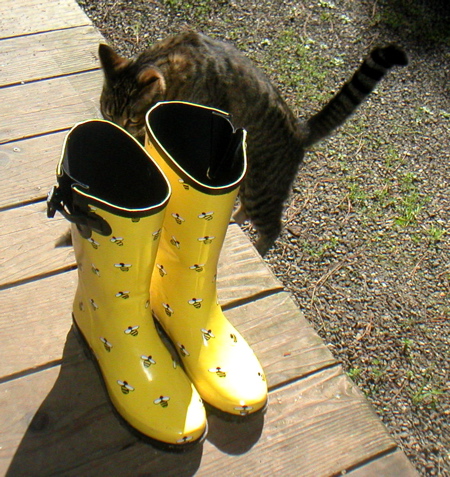Mar 31 2010
Starring San Francisco

Spot the kitty!
It’s almost noon, and my battered thermometer claims it’s barely 40 degrees outside. Some of the hailfall is still clinging to icy existence beside the house, and the house is filled with that eerie white snow light.
Megan stopped by yesterday on her way to work and brought my orchid inside so it will survive the cold snap. It’s now taking up valuable real estate beside the stairs, where I brush past it every time I sidle through the 18 inches of space between the refrigerator and the stairs.
The cold, dark weather this week has inspired me to watch a few films noirs from my favorite decade. Last night’s double feature featured my own true love, the City by the Bay. Henry Etta came up on the couch with me, where she relaxed with her head on a pillow, covered by one of my sweaters (see above) as the rain and hail stormed outside.
First up was “Impact” (1949). Though lacking in my favorite credit (“Gowns By”), it made up for it with “Furs By” and “Jewels By” and an apartment in the illustrious Brocklebank Building, where Kim Novak’s character lived in “Vertigo” and the late, great Herb Caen lived in real life. You can rent a little place there for $9,700 a month if you’d like to join that celebrated company.
Brian Donlevy plays a millionaire industrialist going out of town on a business trip. His lovely wife, played by the seductive Helen Walker, convinces him to bring along a “cousin” of hers, who is, in fact, her lover. The lover attempts to bump off Donlevy, but only succeeds in bumping off himself and a gorgeous cream colored roadster in a spectacular crash.
Dazed and confused, Donlevy ends up in a small Idaho town, where he finds a job and a room with the world’s most attractive and least likely garage owner, played by Ella Raines. But when he discovers that his wife has been arrested for his own “murder”, he returns to San Francisco to set the record straight.
Oddly, Helen Walker, whose character engineered a murderous car crash, endured a career-ending car crash in real life. She picked up some GIs who were hitchhiking, and crashed the car. One soldier died and the other two were severely injured, as was Helen, who was tried for murder. She was acquitted, but her career never recovered, and she died of cancer at the age of 47. Her life was more tragic than any movie she ever starred in.
The second feature was the somewhat misleadingly titled “Woman on the Run” (1950), starring the glamorous Ann Sheridan and a cast of unknowns (at least to me). Ann’s husband is out late one night walking their dog when he accidentally witnesses a murder. When the cops arrive and want to put him in protective custody, he thinks they suspect him and “takes a powder”. The police question his wife, and learn that their marriage is on the rocks. The wife learns that her husband has a secret heart condition, and tries to find him before the cops or the real killer do.
The movie ends with a breathtaking and frightening night time roller coaster ride, predating Hitchcock’s carousel horror in “Strangers on a Train” by a year. It was filmed at Playland at the Beach, an amusement park which perched on the dunes of Ocean Beach for nearly a century before being dismantled and replaced by, God help us, soulless condominium boxes. It was great to see it in all its tacky glory, with the terrifying sounds of Laffing Sal (who can still be seen and heard at the Musée Mécanique, now at Pier 45) providing the perfect backdrop to such a scary scene.
And it was wonderful to see that beautiful city in all its glory. Some things haven’t changed at all in 60 years, and others have changed completely. But one thing never changes: the beauty of San Francisco.



















